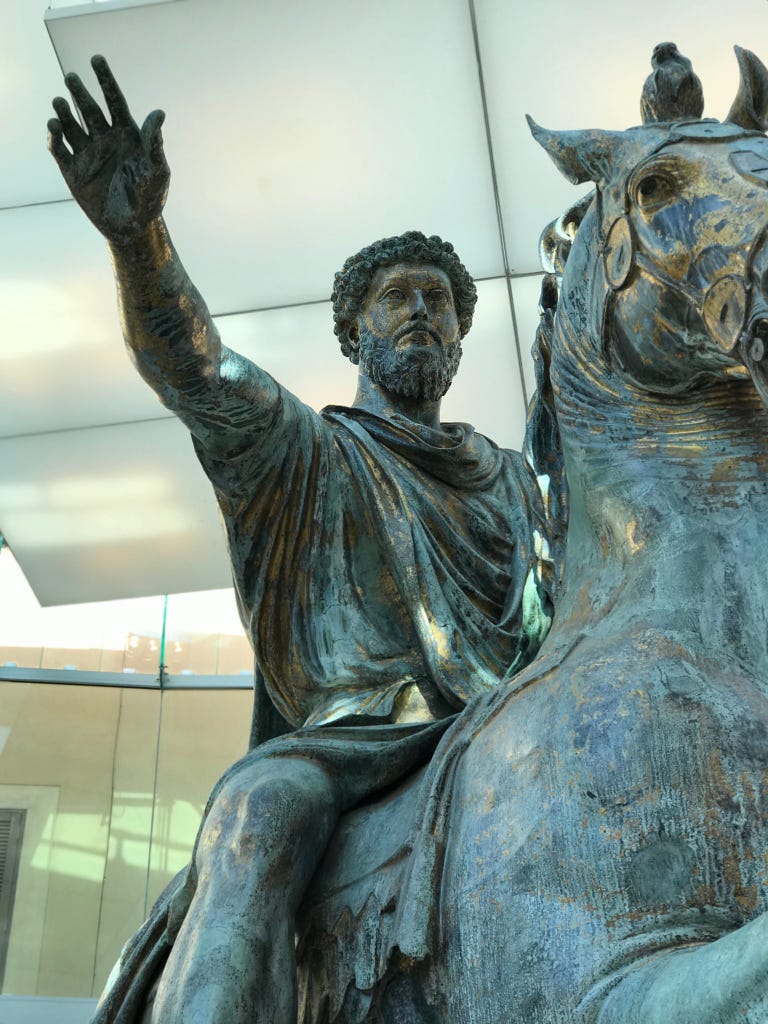Two Roads to the Same Destination: The Rise of Gated Community Politics on Both Left and Right
We live in the age of gated community politics.
This form of politics rests on the idea that the United States and individual American citizens can sequester themselves from the world and each other. It exemplifies a particular sort of moral and political isolationism, an abdication of solidarity with and our obligations to our fellow citizens and humanity as a whole. Whether expressed in a right-wing idiom or a left-wing one, gated community politics both reflects and stimulates the collapse of social trust that’s needed to create and sustain stable and successful societies. Gated community politics denies the possibility of a shared national life, thriving on and amplifying solipsism while dissolving the bonds that link fellow citizens to one another and the world at large.
Both variants of gated community politics are founded on fundamentally misguided understandings of human nature. That’s most obvious with the right-wing version promoted by President Trump, based as it is on excessive pessimism about human nature and the need to build literal walls to cut ourselves off from others. But it’s equally present on the progressive left in the guise of romantic and utopian beliefs about human nature that find substantive expression in calls for foreign policy “restraint” and, more recently, abolish or defund the police at home. Together, privileged left-wing idealism and entrenched far-right pessimism aid and abet one another, each in their own way stimulating and encouraging the gated community mentality that distorts the way we think about politics and society.
Whatever fine distinctions can be drawn between these two ways of thinking about human nature, in the final analysis they’re two roads to the same destination: the gated political community, isolated from one’s fellow citizens and the rest of humanity. Along the way, these two caricatures of human nature flatten our thinking about our shared human experience and leave us unequipped to deal with the complex, messy realities of politics and human life. No matter our starting point, when we adopt either of these misconceived notions of human nature we’re almost certain to wend our way to the gated political community.
It’s easy to recognize the gated community mentality on the right, particularly in the form of President Trump’s “America First” foreign policy and his repeated pledges to build a literal wall on the border with Mexico. An excessive pessimism about human nature undergirds the right-wing school of gated community politics. It sees humanity as inherently egocentric and misanthropic, with every person and every nation out to take advantage of everyone else. We must therefore shape our own behavior accordingly, building walls to keep others out and arming ourselves to the teeth to keep them away. What’s more, we must do our utmost to take advantage of others before they take advantage of us first.
President Trump’s unfulfilled promise to build a wall on the border with Mexico easily stands as the most obvious and concrete manifestation of right-wing gated community politics. In its attempt to keep undesirables out of the country, the wall both literally and symbolically aims to turn the United States into a gated community. Indeed, it’s hard to imagine a better synecdoche for the gated community worldview than President Trump’s “impenetrable, physical, tall, powerful, beautiful, southern border wall.”
But the gated community mentality is far more important as the engine that drives President Trump’s “America First” approach to foreign policy, an attitude that sees the nations of the world as always and everywhere trying to exploit of the United States. In this view, alliances become protection rackets and international trade a matter of exploitation rather than instruments of shared security and mutual prosperity. Witness President Trump’s recent complaint that the “European Union has ripped this country off so much” when it comes to trade, for instance, or his repeated insistence that allies in Europe and Asia pay for American military protection.
In terms of policy, “America First” relies almost solely on coercion. Throwing up tariff barriers and threatening to withdraw from alliances unless other member nations pony up protection money only reflects the narrow-minded, self-serving, and ultimately fearful impulses that lay at heart of the gated community politics on the right. At best, this form of politics cultivates a sense of aggrieved indifference toward the rest of the world. It dissolves any sense of international solidarity among like-minded nations, and reduces the United States to a bystander on the world stage. In consequence, it constitutes both a moral and practical evasion of the complex and difficult realities of international politics. More than anything else, though, the practice of right-wing gated community politics amounts to a self-fulfilling prophecy of the highest - and worst - order by acting as if the world really operates in the way President Trump and his fellow-travelers believe it does.
If President Trump actively aims to remake the nation as a gated community, his professed opponents on the progressive left seem happy to reach the same destination - albeit by a different path. Cloaked in idealistic rhetoric, progressive gated community politics are no less destructive than its right-wing mirror image of the bonds of solidarity on which society depends. Nor is it any less founded on fundamentally misguided notions of human nature than its counterpart on the right.
Indeed, progressive gated community politics rests on romantic and utopian ideas surrounding human nature. Believing humanity to be intrinsically innocent but corrupted by a base and sinful society, at the end of the day progressive gated community politics yields a blithe and privileged anarchism that frequently finds adherents among the relatively well-off upper-middle-classes of society. With a healthy dose of condescending solipsism, this mentality asserts that the American society and the United States constitute the main root of all that’s wrong with the world in some way, shape, or form. As a result, society itself - and “primacy” and “liberal hegemony” in the foreign policy context - must somehow be “dismantled” or otherwise destroyed to clear the way for the progressive utopia that will inevitably and ineluctably emerge from the ruins.
Ultimately, however, this worldview amounts to a counterfeit altruism that can only be offered by those who have the means to exempt themselves from its consequences. It’s no exaggeration to say that this atavistic mode of progressive politics fosters the very conditions that lead to the demand for gated communities in the first place. The emergence of the progressive gated community mentality marks an enormous regression in supposedly left-wing political thinking, a renunciation of the ideals of solidarity and shared citizenship in the name of an allegedly higher morality.
This moral and political isolationism can be found first and foremost in the foreign policy doctrines that fall under the rubric of “restraint.” Advocates of “restraint” assume that a wholesale American retreat from the world will lead to an improvement in the existing state of international affairs. Presuming the exercise of American military power to be the root of all international problems, advocates of “restraint” assume that the removal of said military power can only have salutary consequences for global security and stability. Leaving our erstwhile allies in Europe and Asia to fend for themselves against regional powers like Russia and China will therefore cause few if any problems, allowing the United States to focus more intently on its own domestic problems and inaugurate a new age of global cooperation on problems like climate change. Dismantle “liberal hegemony,” in other words, and the world will see something close to an Edenic efflorescence of peace and security.
But while advocates of “restraint” clothe themselves in righteous rhetoric and take a very different rhetorical path than that taken President Trump and “America First,” their preferred foreign policy approach winds up in the very same gated community. In both cases, America finds itself isolated and alone in the world after it severs the moral and political bonds that attach it to its friends and allies around the globe. Presenting themselves as mere realists, advocates of “restraint” foster a gated community mentality on the left that’s strikingly similar to its counterpart on the right. This gated community may appear more welcoming, but it nonetheless remains walled off and separate from the rest of the world in its own pernicious way.
On the domestic front, notions of foreign policy “restraint” find an uncanny analogue in newly-fashionable calls to defund - or even abolish - local police forces. Even more than advocates of “restraint,” progressives aiming to starve law enforcement of resources exemplify the romantic and utopian assumptions about human nature that animate the gated community mentality on the left. This worldview takes for granted the notion that the state and society themselves constitute the major source of societal dysfunction and, more crucially, that the diminution of public authority does not and cannot logically entail a rejection of the ideals shared citizenship and solidarity necessary for a diverse and variegated society to function even at a most basic level.
Progressive ideologues on the Minneapolis City Council, for instance, voted to abolish the metropolitan police department - but provided three members of the council with private security details in the weeks surrounding the vote that followed the apparent murder of an unarmed man at the hands of the police. The head of the city council has even argued the desire for basic public protection against crimes like armed robbery “comes from a place of privilege.” Likewise, the progressive residents of one Minneapolis neighborhood have found themselves contending with growing public disorder - but refuse to call the police or cooperate with prosecutors on ideological grounds, even when compelled to turn over the keys to their cars at gunpoint. Meanwhile, gun violence on the North Side of Minneapolis continues to take its toll, with over a hundred people shot and eight killed since Memorial Day. Residents of this less well-off neighborhood can catalogue their fair share of problems and issues with the police, but look askance at calls by local progressive ideologues to defund or abolish law enforcement.
From the Balkans in the 1990s to Iraq and Syria in the 2000s and 2010s, the world has seen this movie before and it doesn’t end well. In the absence of a legitimate public authority able to enforce the law and provide a modicum of security, people will seek safety in the confines of narrower and narrower social units based on allegedly primordial identity markers. Those with means to afford private security will avail themselves of it, withdrawing from society and into their own heavily-policed gated communities. Nor does community security provided by one’s neighbors - an alternative offered by more radical police abolitionists - avoid the gated community problem, and indeed may make matters worse. As the philosopher Michael Walzer notes, this sort of “neighborly surveillance” has its own long and sordid history from Calvinist Geneva and Puritan England to Revolutionary France and Maoist China.
Above all else, though, progressive gated community politics stands as a repudiation of solidarity with one’s fellow citizens and, indeed, the rest of humanity. Its practitioners amputate these indispensable common bonds and fail to envisage - much less consider - the predictable consequences involved. In the pursuit of an idyllic illusion, they unwittingly propose to slip back into circumstances uncomfortably akin a Hobbesian state of nature. Though it may start from vastly different and much more idealistic (though no less misguided) suppositions about human nature than its right-wing equivalent, progressive gated community politics merely charts a different path to the same destination.
So how can we escape the politics of the gated community?
We can start by recognizing the practical implications inherent in both progressive and right-wing manifestations of gated community politics. Both reassure us that we’ll reap nothing but benefits when we cut ourselves off from our fellow citizens and loosen our ties to the rest of humanity. In reality, these forms of politics do nothing so much as dissolve the bonds of solidarity and shatter the individual public-spiritedness so vital and necessary to functioning societies. They constitute a retreat into moral and political isolationism, and an abdication of responsibility and concern for one another as citizens and human beings. In its progressive incarnation especially, gated community politics results in both an ethical and physical withdrawal from society by those who can afford their own protection. As the great labor and civil rights leader Bayard Rustin put it in the late 1960s, left-wing “pseudo-revolutionaries” who advocate utopian political romanticism but “can retreat into their universities and suburbs” when faced with the practical consequences of their worldview “deserve special condemnation.”
More importantly, we can reject the fundamentally misguided beliefs about human nature posited by proponents of gated community politics on both left and right. Neither the excessive pessimism of the gated community right nor the romantic utopianism of the gated community left evince much (if any) contact with living, breathing human beings in all their complexity and contradiction. Nor do they reveal much real regard for actually existing people. A certain solipsism prevails in gated community politics on both ends of the political spectrum, as if the world does not exist outside the mental constructs about human nature they’ve built for themselves. Indeed, these erroneous understandings of human nature serve only to flatten the human experience, reducing it to caricatures that invariably lead to either self-fulfilling prophecies or perverse outcomes. The end result of the gated community mentality across political and ideological lines is an inability - or an outright refusal - to think about complicated moral, political, and policy questions that by their very nature can’t be forced into the procrustean bed of ideology.
To truly escape from the prison of gated community politics, though we need more balanced and refined beliefs about human nature. These ideas would acknowledge the positives and negatives of human nature in concert, considering its strengths together with its weaknesses. As a matter of fact, philosophical and religious traditions have been conceiving and elaborating such ideas throughout human history. The ancient Stoics, for instance, developed a subtle and sophisticated view of human nature that involved the use of reason on behalf of the common good of both the particular society in which we happen to live as well as humanity as a whole. But they also understood that it’s foolish to expect no one to ever do wrong or wrongdoers of any and every stripe not to exist; indeed, the Stoic philosopher-statesmen Seneca and Marcus Aurelius took pains to remind themselves and their literary interlocutors to anticipate encountering such mistaken and misguided people in daily life. This ancient school of philosophical thought offered a nuanced and reflective account of human nature that aimed to delineate it, detail its requirements, and, perhaps most importantly, why we so often fail to live up to it.
Other philosophical and religious traditions can offer similar accounts of human nature. Though Thomas Hobbes, for instance, remains best known for his deeply pessimistic speculative description of the state of nature, he also contended that humanity could emancipate and protect itself from this dire predicament by delegating authority to a overwhelmingly powerful sovereign state. But the specifics of these ideas about human nature remain less important than the fact that it’s possible to have fully developed philosophical or religious understandings of human nature without resorting to the distorted and simplistic views that undergird the gated community mentality. We’d all be better served by adopting the richer accounts of human nature these ways of thinking offer.
The task before us today, however, mostly involves holding the line against the moral and political isolationism offered by gated community politics across the political spectrum. It’s a difficult assignment, but looking forward it will prove vital to maintain the bonds of common humanity and shared citizenship necessary for any society to function - and function well. These bonds are under active assault from both right and left: the former holds an extremely pessimistic view of human nature that denies such bonds exist outside an exceedingly narrow confines, while the latter advances romantic and utopian notions that only serve to dissolve these bonds. In the end, they’re merely different roads to the same destination: the gated community.
But we can still turn back the tide of gated community politics if we reject the misguided and false understandings of human nature on which it relies. Instead, we can and should adopt and put forward more balanced ideas about human nature that strengthen the bonds of solidarity that unite us with our fellow citizens and humanity writ large. If we shed the moral and political isolationism at its root, then perhaps we can reject the temptations of gated community politics wherever they may emerge.






